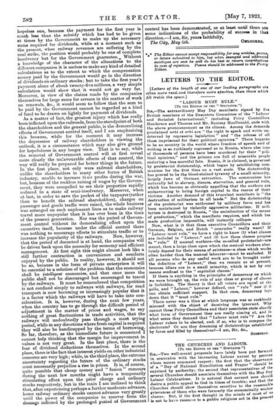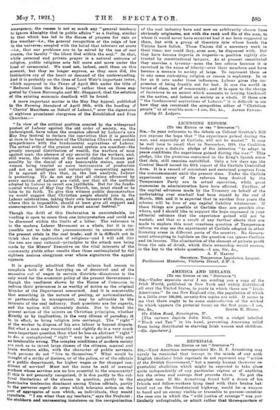THE CHURCHES AND LABOUR.
[To THE EDITOR OP THE " SPECTATOR.") Sia,—Two well-meant proposals have lately been put forward in connexion with the increasing Labour unrest by persons whose names command respect : the first that the observance of a "Day of National Humiliation and Prayer " should be enjoined by authority; the second that representatives of the several Churches should associate themselves with the May Day Labour Celebrations. It is natural that earnest men should desire a public appeal to God in times of trouble; and that the Churches should show themselves sensitive to the reasonable grievances of those who were formerly the economically weaker classes. But, if the first thought in the minds of most of us is not to have recourse to a public religious act in the present
emergency, the reason is not so much any "general tendency to ignore Almighty God in public affairs" as a feeling, similar to that which has led to the disuse of prayers for rain or fine weather—i.e., the general recognition of the reign of law in the universe; coupled with the belief that /aborare est orare —i.e., that our problems are to be solved by the use of our reason, the faculty " the likest God within the soul." So that, while personal and private prayer is a natural outcome of religion, public religious acts fall more and more under the head of ceremonial. We need not, indeed, omit them on this account, but they no longer express, as they once did, the instinctive cry of the heart or demand of the understanding. And it is probably on the lines of Lord Weir's important letter, which appeared in the Times of April 30th under the title of "Reduced Costs the Main Issue," rather than on those sug- gested by Canon Burroughs and Mr. Sheppard, that the solution of the existing economic deadlock will be found.
A more important matter is the May Day Appeal, published in the Evening Standard of April 20th, with the heading of " Clerics' Manifesto on Behalf of Labour," over the signatures of eighteen prominent clergymen of the Established and Free Churches :- " In view of the critical position created by the widespread protest of Labour against the old order of society, we, the undersigned, have taken the occasion offered by Labour's own May Day festival to declare the conviction that it is possible at once to be loyal members of the Christian Church and ardent sympathizers with the fundamental aspirations of Labour. The actual evils of the present social system are manifest—the grossly unequal distribution of wealth, the warfare of man against man, the absence of any security for the workers, and, still worse, the violation of the sacred claims of human per- sonality by the denial of any honourable status, men and women being treated as mere instruments of production and not as intelligent and voluntarily co-operating agents. It is against all this that, in the last analysis, Labour is protesting. We do not say that all claims advanced by every section of Labour are valid, nor that all the methods adopted by Labour in revolt are justifiable. But for the funda- mental witness of May Day the Church, too, must stand or be false to its faith. To give this witness public demonstration we would suggest that Christian people should join in the Labour celebrations, taking their own banners with them, and, where this is impossible, should at least give all support and encouragement to Labour in its great annual festival."
Though the drift of this Declaration is unmistakable, its wording is open to more than one interpretation and could not be discussed within the limits of a letter. The reference is to the modern Labour Movement as a whole, but it is im- possible not to take the pronouncement in connexion with the present crisis in the coal trade; and it is difficult not to think that the application of religious—and I will add (for the two are one) rational—principles to the attack now being made by the Miners' Executive on the vital interests of the community yields other results than those contemplated by the eighteen zealous clergymen over whose signatures the appeal appears.
It is generally admitted that the miners had reason to complain both of the hurrying on of decontrol and of the excessive cut of wages in certain districts—disastrous is the only word for the economic policy of the present Government— though the readiness shown by the House of Commons to redress their grievances is as worthy of notice as the original blunder of the Department concerned. And it is conceivable that something in the nature of pooling, or nationalization, or partnership, in management, may be advisable in the interests of the coal industry. Such questions are for experts, and the nation will ultimately decide. But to defend the present action of the miners on Christian principles, whether directly or by implication, is the very climax of paradox; it is, in effect, to bring religion into contempt. The " right" of the worker to dispose of his own labour is beyond dispute. But what a man may reasonably and rightly do is a very much more important question than what he has an abstract " right " to do; a metaphysical " right " may be a palpable folly and an intolerable wrong. The complex conditions of modern society are such as to invest large classes of the citizens, manual and brain workers alike, with the character of public servants. Such persona do not " live to themselves." What would be thought of a strike of doctors, or of the police, or of the officials of a public department, for higher wages or for changed con- ditions of service? Must not the same be said of manual workers whose services are no less essential to the community? If this is not generally recognized, it le due partly to the cul- tural limitations of the classes in question, partly to the doctrinaire tendencies dominant among Union officials, partly to the perverse esprit de corps which tolerates action on the part of aggregates of men which, as individuals, they would repudiate. " I am wiser than my teachers," says the Psalmist : the stubborn and unreasoning insistence on the reorganization
of the coal industry here and now on arbitrarily chosen lines obviously originates, not with the rank and file of the men, to whom it would never have occurred had it not been suggested to them, but with a group of theorists into whose hands the Unions have fallen. These Unions did a necessary work in their time; nor could they, even now, be dispensed with. But they have become imperia in imperio—e. position rightly dis- trusted by constitutional lawyers. As at present constituted they exercise a tyranny—none the less odious because it is exercised in the name of liberty—over their members and have become a menace to society at large. To represent them as in any sense embodying religion or reason is sophistry. In so far as it acts under these influences, Labour gives the im- pression of being frankly out for loot. It sees the world in terms of class, not of community; and it is open to the charge of incivisme to an extent which amounts to levying blackmail on the nation, and indeed on society as a whole. If these are " the fundamental aspirations of Labour," it is difficult to see how they can command the sympathies either of "Christian people " or of sensible men.—I am, Sir, &c., ALFRED FAWKES.
Ashby St. Ledgers.



































 Previous page
Previous page